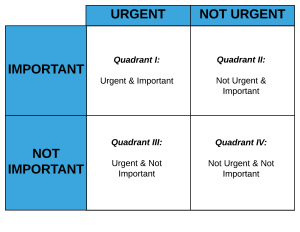
04 Feb Matters of Time
4 February 2025
By David Allen, Development for Conservation
The funny thing about nonprofit work is that we are regularly called to accomplish 120-150% of what might be humanly possible in a day or a week – and we like it that way.
Think about it.
If the workload is so obviously too much, and if no one (including us) really expects to get everything done anyway, and if not everything gets done because of all the things that do – if all those things are true, then we get to do whatever we want. After all, we’re fighting the good fight.
But sometimes at the expense of things that might have been more important.
I think this dynamic is especially true when it comes to donor development work. Writing personalized thank you letters, picking up the phone, getting out of the office for coffee with a major gift prospect, actually asking for money – these things just aren’t as much fun as planning the outreach event, posting on social media, or wading through email several times each day.
I see this on a personal level and also in committees where donor development work is paired with anything else – communications, outreach, events, volunteer management, and so on. Those things get done first, because they are less emotionally demanding, and “Look at that! It’s 4:30 on Friday afternoon. I’ll start the donor development work next week.”
There’s a famous model called the Eisenhower Matrix that juxtaposes things that are urgent against things that are important. You’ve probably seen it, or at least a version of it:
Time management gurus tell you to “Just Do It” for the items in Q1, schedule work time for things in Q2, delegate things in Q3, and throw away items in Q4.
So WHY aren’t we always working in Q1 and Q2? I believe the answer is that some of the items in Quadrants 3 and 4 are more fun. We start each week, and often each day, by combing through the data dump that filled our email inboxes and social media feeds. We start each day distracted.
So here are three not-so-new but still powerful ideas for getting the most importance out of your days and weeks this year. They are not panaceas. You will still need to develop the discipline to get the work done. But at least conceptually, they might help.
Plan to Succeed
Surveys of business owners in nearly every sector have repeated the same result over decades: the number one reason leaders say they don’t plan is that they don’t have time. So, regardless of what else is happening, regardless of the hounds at the door, make time to plan.
Planning isn’t something you do every three years and then check it off and forget about it. It’s not even something to do once a year or once a quarter. Planning is something you live. Every day.
I get that everyone has their own levels of tolerance for planning and their own aptitudes for getting it done. I’m not here to impose my own onto anyone else.
But I can tell you this: when I begin to feel overwhelmed, when I feel the walls closing in, when my to-do list is longer on Friday afternoon than it was on Monday morning, when I catch myself carrying-over the same things I’ve been carrying over since last August, I know that it’s time to redo the plan. This one isn’t working.
So take a moment every day or at least every week and write down (on paper!) the three things that are the most important for you to complete this week. And do that every week. Then take a moment each day to remind yourself of the most important things to do today.
Time-Boxing
Time boxing essentially means that you calendar appointments with yourself to get specific tasks done. At those appointed times, you put blinders on, and crank through the stuff you need to do, safe in the knowledge (or at least in the wishful belief) that you have boxed enough time for everything else.
I use Google’s calendar app, and I have multiple gmail accounts so I can overlay my time boxed tasks onto my appointments calendar or not as I may need to. It becomes much easier to tell when I am “full” in any given week.
This is a discipline, and one gets better at it over time. Turn off your distractions. Close your door (if you have one), and work the plan.
Use the first hour of every day
Before you open your email, look at your texts or social media, or listen to phone messages – before you allow anything to clutter up your day, knock something off your Q1 or Q2 lists. Create your own priorities, but here’s some daily suggestions:
Monday – Review your priorities for the next two weeks, break up larger efforts into manageable tasks, assign a Q1 to Q4 ranking for each item, and work on scheduling the meeting appointments you will need. It may take some backing and forthing to get meetings with donors, colleagues, vendors, and others. Staring on Monday morning will help you. Pay particular attention to items that are considered Q2 Highly Important but Low Urgency. Time-box enough calendar space to get those done during the week. Take a look at your Q3 activities and see if you can delegate those to someone else.
Tuesday – Pick out a Q1 High Importance – Highly Urgent project to work on – get it done
Wednesday – Take a careful look at your individual donor lists and the plans you have set up for their cultivation, solicitation, and stewardship. Take special note of any tasks that might be due in the next few weeks. See what you can get done now – without waiting.
Thursday – Devote the first hour of Thursday morning to knocking out a writing project – especially one that might not be due for some months, like a foundation report, appeal letter, or newsletter article.
Friday – Make a list of people to thank – staff, Board directors, volunteers, donors, and so on. Make time to make it personal. Press send.
If you have developed your own coping mechanisms, I’d love to add to this list. Please use the comments section to share what works for you.
Cheers and Have a Good Week!
-da
PS: Your comments on these posts are welcomed and warmly requested. If you have not posted a comment before, or if you are using a new email address, please know that there may be a delay in seeing your posted comment. That’s my SPAM defense at work. I approve all comments as soon as I am able during the day.
Photo by Alain Audet courtesy of Pixaby.




Sally
Posted at 15:26h, 04 FebruaryGreat advice, David. Thanks. I’ve begun to pay more attention to my morning routine, taking a hands-off approach to my cell phone and ignoring emails until I get at least an hour or two of solid work done. I’m also working hard NOT to multitask. That is making a real difference to what I’m able to accomplish.
A.B.
Posted at 07:46h, 04 FebruaryThis is just the encouragement I need right now, David, thank you. I find I need extra boxing inside time boxing, so I often will use my oven timer to block 20 min segments — long enough that I might have tackled a piece of the project yet short enough that if I’ve wandered, I haven’t gone too far astray. Apparently this became known as the Pomodoro Method, but I’ve been using it for decades. Here’s to harnessing our brains and spirits for good!
Karrie
Posted at 07:22h, 04 FebruaryThis is a great reminder and NUDGE about all the distractions. SO TRUE! I’m on the brink of a potential major campaign as part of a one and 1/2 person development team – the distractions are many at the same time we are trying to build a major gift program and increase our membership base (I’ll be looking in your amazing archives for direction on this) and working on our appeal schedule/cycle for the calendar and fiscal year. Your remarks about using “the impossible” to get myself off the hook for the big things is really impactful. Thanks again! Really appreciate your expertise.